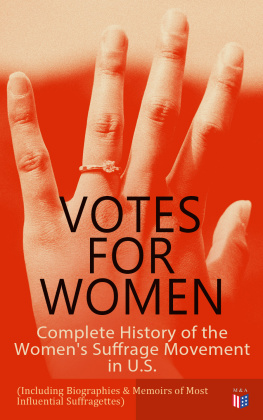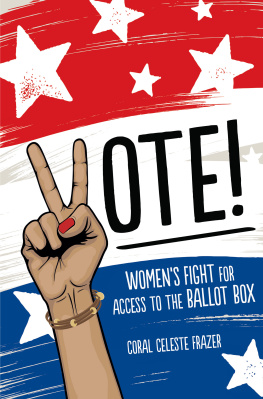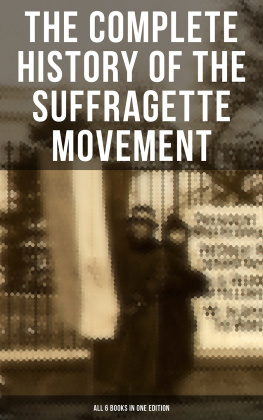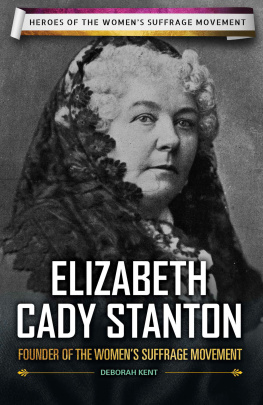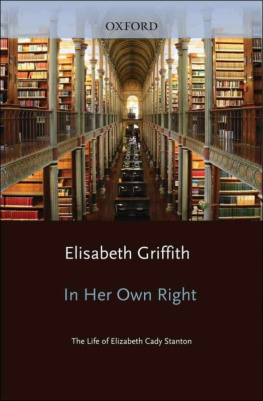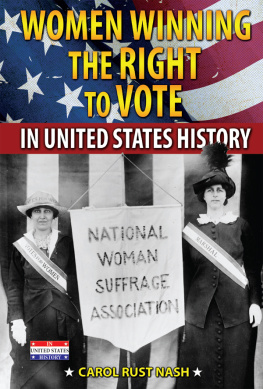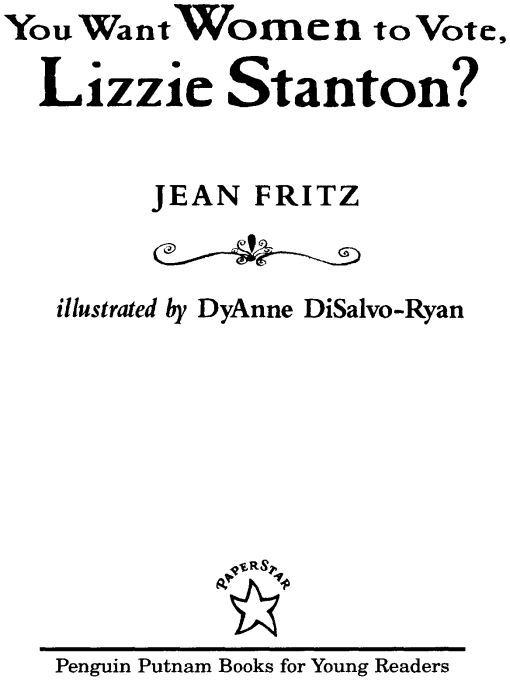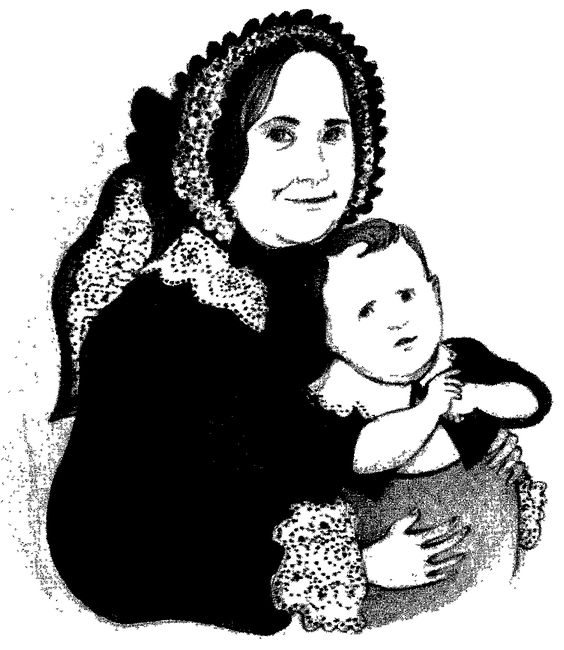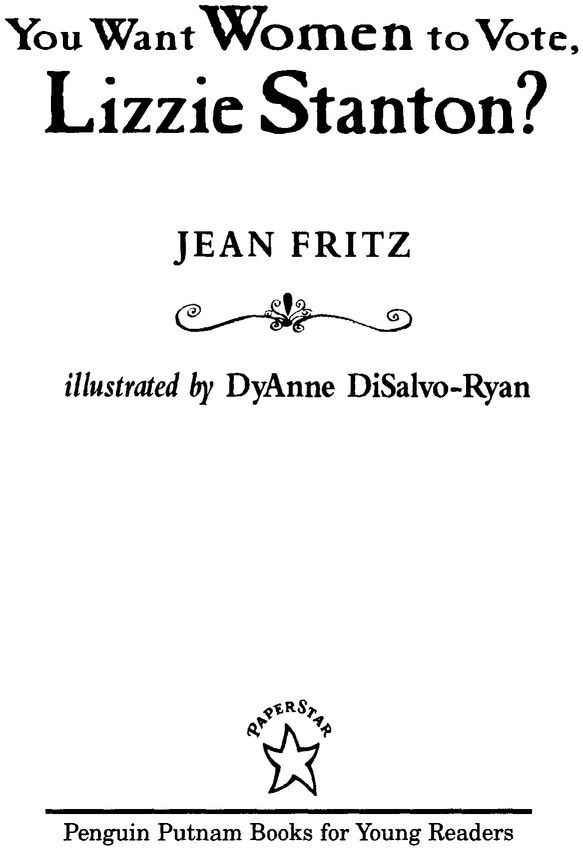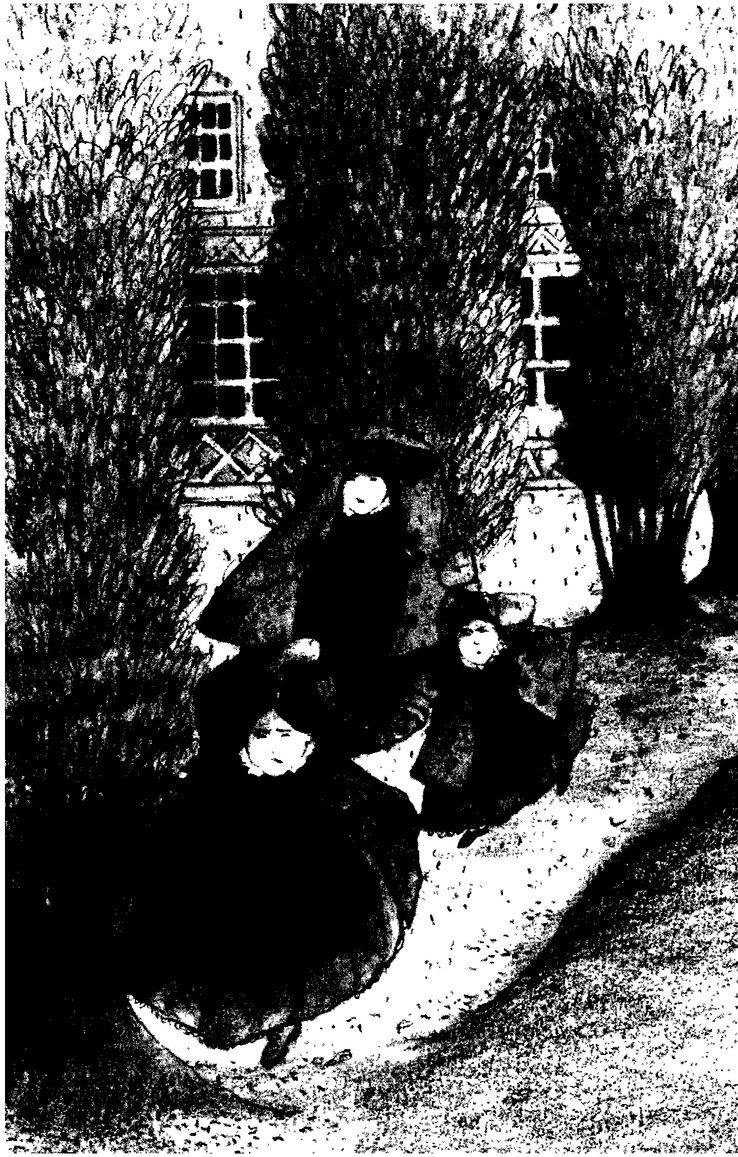Table of Contents
Other PaperStars by Jean Fritz
AROUND THE WORLD IN A HUNDRED YEARS
BULLY FOR YOU, TEDDY ROOSEVELT!
MAKE WAY FOR SAM HOUSTON
STONEWALL
THE GREAT LITTLE MADISON
TRAITOR: The Case of Benedict Arnold
HARRIET BEECHER STOWE AND
THE BEECHER PREACHERS
Elizabeth Cadystanton Cady Stanton
To Tina
CHAPTER ONE
Yes, Elizabeth Cady Stanton did want women to vote. It was an outlandish idea, but thats what she wanted. Not at first. As a child, she knew that girls didnt count for much, but she didnt expect to change that.
First she had to grow up. She was born Elizabeth Cady in 1815 in Johnstown, New Yorka gloomy-looking town that cowered beneath poplar trees. Elizabeth hated poplar trees. They stalked down the main street, unbending, stiff with pride. In the spring they let loose thousands of dangling yellow inchworms, which dropped, like an obscene kind of weather, on people passing beneath. If you had been around then, you might have seen three little girls, their hands over their heads, dodging the trees, racing for home.
They were the Cady sistersElizabeth (or Lizzie), Harriet (five years older than Elizabeth), and Margaret (three years younger). You couldnt miss them. They were dressed alike, always in red dresses, black aprons, red stockings, red mittens, red coats, and red hoods. Elizabeth hated red. And she hated the prickly, starched ruffles around the necks of the dresses. Sometimes she might run a finger between her neck and the ruffle, but that wasnt ladylike, her mother said. Grown men could tear off their collars and ties and throw them down, but she was a girl and she couldnt even fool with a ruffle. Elizabeth must learn to crochet, knit, and embroider. To anything that Elizabeth wanted to do, her mother would say no. Anything Elizabeth disliked was exactly what her mother wanted. And who could stand up to Mrs. Cady? Almost six feet tall, she towered over the girls like a poplar tree, dropping her nos, her everlasting no! no! no! as if that was the only word that she trusted.
Elizabeth carried some of her childhood likes and dislikes right through her life. Never as a grown woman, for instance, would she wear red. As for embroidering, she thought it was pitiful the way some women used up their energy embroidering cats on the toe of some slipper, or tulips on an apron. It was enough to make angels weep, she said.
What Elizabeth did like to do was to visit her father, Judge Cady, in his law office. Sometimes she was allowed to sit in a corner of the room and listen to his clients as they poured out their problems. Often she got angry, particularly if the clients were women. Her father seldom seemed able to help women. Flora Campbell, for instance, had bought her familys farm with her own money, but when her husband died, he had willed it to their son. And he didnt take care of it. What was more, he was mean to her. What could she do?
Nothing, Judge Cady replied. When she married, she became, in the eyes of the law, an extension of her husband.
All that she owned, all that she earned, even her children became her husbands property to do with as he chose. And he chose to give the farm to a good-for-nothing son.
As soon as Flora Campbell left, Elizabeth exploded. How could the law be so unfair? she asked. Judge Cady took down from his shelves a big law book and showed Elizabeth the law in print.
There was only one thing to do, Elizabeth decided. She would cut that law right out of her fathers book. No, her father said. That would do no good. Not even if she cut the law out of all the copies of the book in New York State. The law was made by legislatorsall menin the state capital at Albany, and only they could change it.
Elizabeth had never heard of anything so ridiculous. No wonder men thought they were special. No wonder fathers preferred sons to daughters. And here were the Cadys with five daughters: Tryphena (the oldest) and Catherine (the youngest), in addition to Harriet, Elizabeth, and Margaret. The family couldnt seem to hang on to boys. Three sons (two Daniels and one James) had been born and died before Elizabeth came along, and now only Eleazar was left. Nine years older than Elizabeth, he was both smart and brave as a boy was supposed to be. And of course he was the apple of his fathers eye.
But when Elizabeth was eleven years old, Eleazar died. He had just graduated from Union College, and before anyone realized what was happening, the church bells were tolling for him. Elizabeth hated the sound of those church bells. No, no, no, they seemed to say. No without end. Still, it was her father who broke her heart. Sitting beside the coffin, Judge Cady looked so haggard, so forlorn, so empty that Elizabeth slipped onto his lap to comfort him.
Judge Cady sighed. I wish you were a boy! he said.
Of course Elizabeth could never be a boy. Still, perhaps she could make it up to her father if she became just as good as a boy, as smart and brave as Eleazar had been. So thats what shed do. To be smart, she would study Greek. To be brave, she would learn to ride a horse so well that she would be able to jump fenceseven high fences.
The first chance she had, she persuaded the preacher next door to give her Greek lessons. And she took out the fastest horse in her fathers stable for a ride. She knew it would take time to become smart and brave, but in the end her father would surely say what she wanted to hear. Elizabeth, he would say, you are just as good as any boy.
Before long Mrs. Cady did have one more baby. It was a boy, but he didnt last either. The church bells tolled again, but this time when the family walked to the graveyard, Edward Bayard walked with them. He was studying law with Judge Cady and would soon marry Tryphena.
Elizabeth liked him. He taught her to jump her horse across ditches and over fences. Gradually the fences became higher. Two feet, three feet, and when she began clearing four-foot fences, her father must have heard about it. But he didnt say what she wanted to hear. Nor did he say anything when Elizabeths Greek teacher bragged about how well she was doing. Nor when Elizabeth was put into the highest class of mathematics and languages at Johnstown Academy. She was the only girl in the class and did every bit as well as the boys, but stillnot a word. Then when she was sixteen and finishing at the Academy, she won a prize in Greek. Now, she thought. Now he would say it. She rushed home with the Bible shed won, and put it on her fathers desk.
Judge Cady picked it up and sighed. If only youd been a boy, he said.
Of course Elizabeth was disappointed, but she was not a person who brooded. Now that she had graduated from the Academy, she knew exactly what she wanted to do next. She wanted to go to Union College, where the boys in her class were going.


